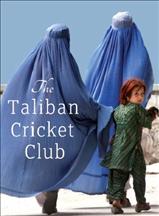 C
C ricket has not caught on to any major extent in Afghanistan even 11 years after the Taliban was pushed out of Kabul in 2001.
ricket has not caught on to any major extent in Afghanistan even 11 years after the Taliban was pushed out of Kabul in 2001.
The sports-shy Afghans are still too battle-scarred to laugh their angst away on the pitch.
However, literary fiction explores unimaginable possibilities for peace in Afghanistan and escape from the daily acts of subversion.
Cricket, the game of friendship, and the tyranny of the Taliban in Afghanistan are pitted in a battle of wits and convey a powerful message of freedom, human resilience and defiance in ‘The Taliban Cricket Club’ (Aleph Book Company), a new novel by award-winning writer, playwright and filmmaker Timeri Murari.
“The possibilities of putting two opposites together and exploring their sheer contraction made me use cricket as a symbol of democracy, freedom, discipline and harmony against the tyrannical regime of the Taliban,” Mr Murari said.
He said that he had read a small news clipping in 2000, according to which the Taliban was trying to promote the game that was against violence.
“The idea was bizarre. I started making notes and researched about the Taliban-led Afghanistan. Cricket did not happen in Afghanistan till 2002, when Afghans began to play the game more seriously after the Taliban left,” he said.
Time magazine chose his ‘Square Circle,’ as one of the top 10 films.
Mr Murari said that two-and-a-half million refugees in Pakistan had started playing the game after leaving Afghanistan.
“They brought the game back to Afghanistan. In 2000, no one played the game in Afghanistan. The Taliban had even banned Buzkhasi, a team sport played on horseback. I decided on a cricket tournament and a formal team as my theme to teach the Afghans to play the game,” he said.
But cricket as a game could not really take off in Afghanistan, he rued.
Train to Pakistan
Mr Murari steps in the shoes of an Afghan woman, Rukshana, who is offered an escape route by the Taliban from her warring nation to Pakistan when the local Taliban warlord Wahidi announces that the winning team of a cricket tournament that he is organising will be sent to Pakistan to train for an international-level match.
No one in Afghanistan knows how to play cricket except Rukshana. She had learnt the game during her years in New Delhi as a student of journalism.
Mr Murari speaks through the voice of Rukshana, a beautiful young journalist forced to hide behind the burqa after a raid on her office in Kabul.
She prepares to play the game to escape.
Here the writer twists the tale. When Rukshana’s team comprising family wins the match, the Taliban warlord betrays Rukshana and decides to send his nephew’s state team (the loser) to Pakistan.
The Great Escape
The betrayal and the Taliban warlord’s personal designs on Rukshana (he wants to marry her) forces her to hatch a daring escape plan to impersonate as the rival team to flee to Pakistan.
Cricket in Mr Murari’s book becomes a metaphor for freedom and a symbol of a Sub-Continental romance between the protagonist Rukshana and her friend’s brother Veer, a young man from India.
For most part of it, the plot reads like a movie, gripping and veering off unexpected bends.
“The idea of teaching cricket to Afghans did not feel strong enough. So I thought if I had a woman to play the game and teach it to her cousins and brothers to escape the Taliban, she would become a symbol of rebellion through the game,” Mr Murari said.
He went to Afghanistan in 2010.
“I had a contact set up meetings with a cross-section of people. The women told me how they lived in Afghanistan and survived the Taliban. The Afghan people are the most hospitable and generous people, but they are not a sporting country. They play football and are sending few athletes to London,” he said.
According to him, women are discouraged from sports in Afghanistan because it spells freedom and healthy life.
Mr Murari said that the socio-political milieu was slowly changing in Afghanistan.
“The women I spoke to were professionals and they were not always accompanied by male members of their families. The country had a growing tribe of women journalists – some of them dating to the Taliban years, who secretly couriered their dispatches to organisations like Revolutionary Association of Women in Afghanistan (RAWA) located in Pakistan, who would run these stories.”
Mr Murari said that the condition of Afghanistan was fragile.
“I think that the country could plunge into a civil war and break into three autonomous regions after US troops go home,” he said.






